Books
Visit John Boudreau’s Amazon Author Central Page →
Work without Jobs: How to Reboot Your Organization’s Work Operating System
Ravin Jesuthasan and John Boudreau (The MIT Press, 2022)
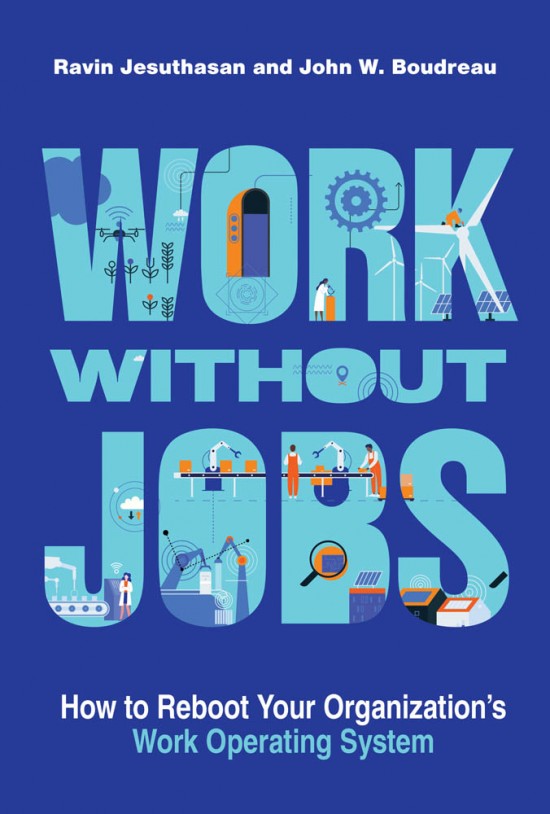 Work is traditionally understood as a “job,” and workers as “jobholders.” Jobs are structured by titles, hierarchies, and qualifications. In Work without Jobs, Ravin Jesuthasan and John Boudreau propose a radically new way of looking at work. They describe a new “work operating system” that deconstructs jobs into their component parts and reconstructs these components into more optimal combinations that reflect the skills and abilities of individual workers. In a new normal of rapidly accelerating automation, demands for organizational agility, efforts to increase diversity, and the emergence of alternative work arrangements, the old system based on jobs and jobholders is cumbersome and ungainly. Jesuthasan and Boudreau’s new system lays out a roadmap for the future of work.
Work is traditionally understood as a “job,” and workers as “jobholders.” Jobs are structured by titles, hierarchies, and qualifications. In Work without Jobs, Ravin Jesuthasan and John Boudreau propose a radically new way of looking at work. They describe a new “work operating system” that deconstructs jobs into their component parts and reconstructs these components into more optimal combinations that reflect the skills and abilities of individual workers. In a new normal of rapidly accelerating automation, demands for organizational agility, efforts to increase diversity, and the emergence of alternative work arrangements, the old system based on jobs and jobholders is cumbersome and ungainly. Jesuthasan and Boudreau’s new system lays out a roadmap for the future of work.
Visit the Book’s Website Purchase at Amazon
Investing in People: Financial Impact of Human Resource Initiatives (Third Edition)
John Boudreau, Wayne Cascio, and Alexis Fink (Society For Human Resource Management, 2019)
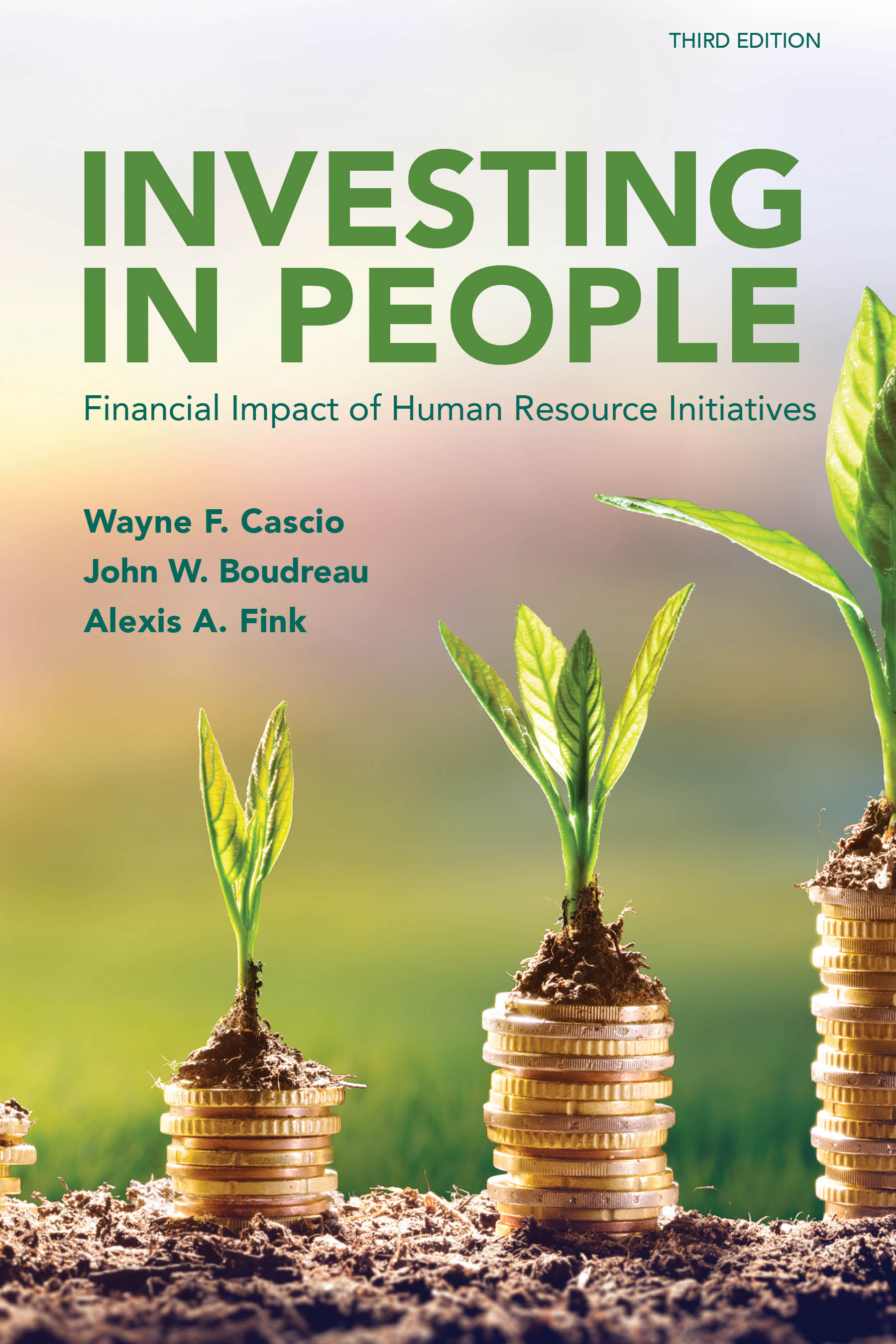 The demand for organizational accountability has never been greater. The future of work, talent, and employment are changing at an unprecedented pace, and organizational decisions about how to invest in people are under increasing scrutiny. Leaders realize their decisions about human resources are crucial in an uncertain and interconnected world, yet decisions about people remain among the least systematic and evidence-based, compared to resources such as money and technology. Investing in People draws upon state-of-the art practice and research across disciplines including psychology, economics, accounting, and finance to provide HR professionals and leaders with proven guidelines for evaluating key HR initiatives.
The demand for organizational accountability has never been greater. The future of work, talent, and employment are changing at an unprecedented pace, and organizational decisions about how to invest in people are under increasing scrutiny. Leaders realize their decisions about human resources are crucial in an uncertain and interconnected world, yet decisions about people remain among the least systematic and evidence-based, compared to resources such as money and technology. Investing in People draws upon state-of-the art practice and research across disciplines including psychology, economics, accounting, and finance to provide HR professionals and leaders with proven guidelines for evaluating key HR initiatives.
Get the Free Software Purchase at Amazon
Reinventing Jobs: A 4-Step Approach for Applying Automation to Work
Ravin Jesuthasan and John Boudreau (Harvard Business Review Press, 2018)
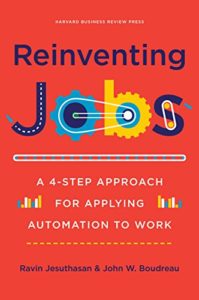 Once the decision has been made to adopt automation and artificial intelligence technologies, leaders face difficult and stubborn questions about how to implement that decision: How, when, and where should we apply automation in our organizations? Is it a stark choice between humans versus machines? How do we stay on top of these technological trends as work and automation continue to evolve?
Once the decision has been made to adopt automation and artificial intelligence technologies, leaders face difficult and stubborn questions about how to implement that decision: How, when, and where should we apply automation in our organizations? Is it a stark choice between humans versus machines? How do we stay on top of these technological trends as work and automation continue to evolve?
Human Resource Excellence: An Assessment of Strategies and Trends
Edward E. Lawler III and John W. Boudreau (Stanford University Press, 2018)
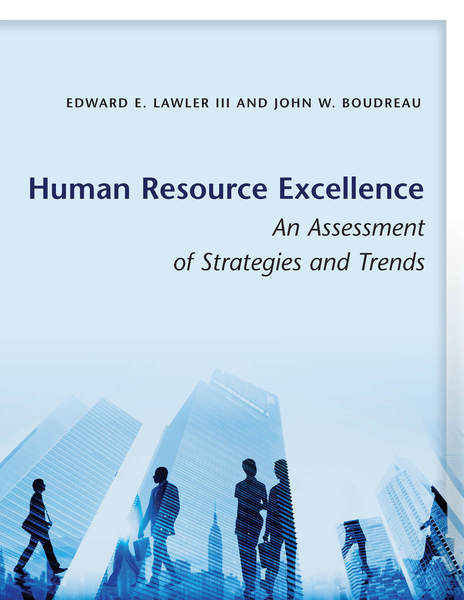 As a field, human resources has been slow to evolve, despite a great need and opportunity for change. Human Resource Excellence delivers the newest findings about what makes HR successful and how it can add value to today’s organizations. Tracing changes in a global sample of firms across the U.S., Europe, and Asia, this landmark volume provides an international benchmark against which to measure a company’s HR practice.
As a field, human resources has been slow to evolve, despite a great need and opportunity for change. Human Resource Excellence delivers the newest findings about what makes HR successful and how it can add value to today’s organizations. Tracing changes in a global sample of firms across the U.S., Europe, and Asia, this landmark volume provides an international benchmark against which to measure a company’s HR practice.
Black Holes and White Spaces: Reimagining the Future of Work and HR with the CHREATE Project
John Boudreau, Carolyn Lavelle Rearick and Ian Ziskin (Society For Human Resource Management, 2018)
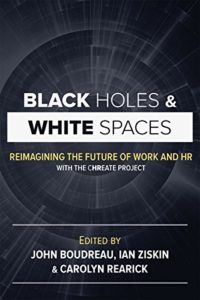 Black Holes and White Spaces describes tools and frameworks that leaders inside and outside the HR profession can use to transform the HR profession and their organizational success. It summarizes the collective wisdom and hard work of over 70 exemplary chief HR officers and other leaders. Their mission: Disruptively accelerate the progress of the HR profession to meet the unprecedented challenges and opportunities of the new world of work.
Black Holes and White Spaces describes tools and frameworks that leaders inside and outside the HR profession can use to transform the HR profession and their organizational success. It summarizes the collective wisdom and hard work of over 70 exemplary chief HR officers and other leaders. Their mission: Disruptively accelerate the progress of the HR profession to meet the unprecedented challenges and opportunities of the new world of work.
Lead the Work: Navigating a World Beyond Employment
John W. Boudreau, Ravin Jesuthasan, David Creelman (Wiley, 2015)
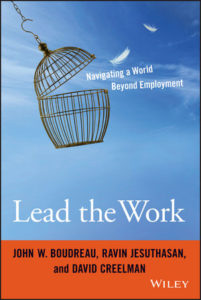 Lead the Work takes an incisive look at the evolving nature of work, and how it’s affecting management and productivity at the organizational level. Where getting things done once meant assigning it to an employee, today’s leaders are increasingly at risk if they fail to recognize that talent can float into and out of an organization. This book explores this phenomenon in detail and provides a roadmap to help managers navigate this new environment.
Lead the Work takes an incisive look at the evolving nature of work, and how it’s affecting management and productivity at the organizational level. Where getting things done once meant assigning it to an employee, today’s leaders are increasingly at risk if they fail to recognize that talent can float into and out of an organization. This book explores this phenomenon in detail and provides a roadmap to help managers navigate this new environment.
Global Trends in Human Resource Management: A Twenty-Year Analysis
Edward E. Lawler III and John W. Boudreau (Stanford Business Books, 2015)
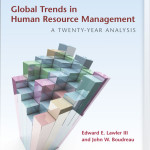 To adapt to the demands of a changing global marketplace, HR is increasingly required to span the boundaries between its function, the organization as a whole, and the dynamic environment within which it operates. This report tracks changes in a global sample of firms that shows how HR differs across Europe, the U.S., and Asia, providing an international benchmark against which to measure a company’s practice and shows how HR can adapt in a rapidly changing landscape.
To adapt to the demands of a changing global marketplace, HR is increasingly required to span the boundaries between its function, the organization as a whole, and the dynamic environment within which it operates. This report tracks changes in a global sample of firms that shows how HR differs across Europe, the U.S., and Asia, providing an international benchmark against which to measure a company’s practice and shows how HR can adapt in a rapidly changing landscape.
Short Introduction to Strategic Human Resource Management
Wayne F. Cascio and John W. Boudreau (Cambridge University Press, 2012)
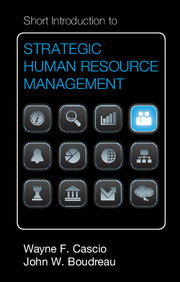 This Short Introduction to Strategic Human Resource Management provides a concise treatment of the key elements of strategic HRM using an innovative risk-management approach. It emphasizes the importance of the decisions, processes and choices organizations make about managing people and shows how workforce management directly affects strategic organizational outcomes. It provides guidance for managers on how to make better human capital decisions in order to achieve strategic success more effectively.
This Short Introduction to Strategic Human Resource Management provides a concise treatment of the key elements of strategic HRM using an innovative risk-management approach. It emphasizes the importance of the decisions, processes and choices organizations make about managing people and shows how workforce management directly affects strategic organizational outcomes. It provides guidance for managers on how to make better human capital decisions in order to achieve strategic success more effectively.
Effective Human Resource Management: A Global Analysis
Edward E. Lawler III and John W. Boudreau (Stanford University Press, 2012)
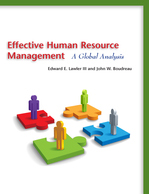 Effective Human Resource Management is the Center for Effective Organizations’ (CEO) sixth report of a fifteen-year study of HR management in today’s organizations. The only long-term analysis of its kind, this book compares the findings from CEO’s earlier studies to new data collected in 2010. Edward E. Lawler III and John W. Boudreau measure how HR management is changing, paying particular attention to what creates a successful HR function.
Effective Human Resource Management is the Center for Effective Organizations’ (CEO) sixth report of a fifteen-year study of HR management in today’s organizations. The only long-term analysis of its kind, this book compares the findings from CEO’s earlier studies to new data collected in 2010. Edward E. Lawler III and John W. Boudreau measure how HR management is changing, paying particular attention to what creates a successful HR function.
Transformative HR: How Great Companies Use Evidence-Based Change for Sustainable Advantage
John W. Boudreau and Ravin Jesuthasan (Jossey-Bass, 2011)
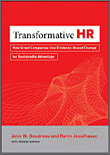 Transformative HR demonstrates how some of the world’s most admired and prominent organizations are redefining HR leadership by using evidence-based change to inform human capital decisions that optimize efficiency, effectiveness and strategic impact. The authors present the five foundational principles to the new HR decision science: Logic-driven analytics, segmentation, risk leverage, synergy and integration and optimization.
Transformative HR demonstrates how some of the world’s most admired and prominent organizations are redefining HR leadership by using evidence-based change to inform human capital decisions that optimize efficiency, effectiveness and strategic impact. The authors present the five foundational principles to the new HR decision science: Logic-driven analytics, segmentation, risk leverage, synergy and integration and optimization.
The Chief HR Officer: Defining the New Role of Human Resource Leaders
Patrick M. Wright, John W. Boudreau, David A. Pace, Elizabeth “Libby” Sartain, Paul McKinnon, Richard L. Antoine, Editors (Jossey-Bass, 2011)
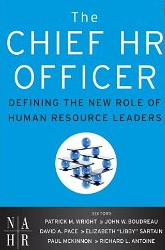 The Chief HR Officer offers the most current thinking on the evolving role of the chief human resource officer (CHRO). An essential resource for experienced and aspiring CHROs, the book shows leaders how to best prepare for and perform this critical role.
The Chief HR Officer offers the most current thinking on the evolving role of the chief human resource officer (CHRO). An essential resource for experienced and aspiring CHROs, the book shows leaders how to best prepare for and perform this critical role.
Investing in People: Financial Impact of Human Resource Initiatives, Second Edition
Wayne Cascio and John Boudreau (FT Press, 2010)
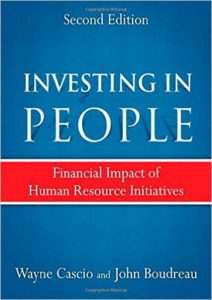 Investing in People introduces a breakthrough approach to Human Resources (HR) measurement that systematically aligns HR investments with organizational goals and helps make HR the true strategic partner it needs to be. Wayne F. Cascio and John W. Boudreau show exactly how to choose, implement, and use metrics to improve decision-making, optimize organizational effectiveness, and maximize the value of HR investments.
Investing in People introduces a breakthrough approach to Human Resources (HR) measurement that systematically aligns HR investments with organizational goals and helps make HR the true strategic partner it needs to be. Wayne F. Cascio and John W. Boudreau show exactly how to choose, implement, and use metrics to improve decision-making, optimize organizational effectiveness, and maximize the value of HR investments.
Retooling HR: Using Proven Business Tools to Make Better Decisions About Talent
John Boudreau (Harvard Business School Press, 2010)
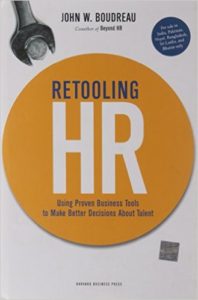 With Retooling HR, Boudreau reveals that the tools HR managers still need to create lasting strategic value don’t have to be invented from scratch. Instead, he explains how the tools that marketing, operations, and finance have developed to solve key problems in their own fields can be successfully applied to HR. Based on research as well as his input from HR leaders and organizations around the world, Retooling HR outlines these tools for radically improving HR’s capabilities.
With Retooling HR, Boudreau reveals that the tools HR managers still need to create lasting strategic value don’t have to be invented from scratch. Instead, he explains how the tools that marketing, operations, and finance have developed to solve key problems in their own fields can be successfully applied to HR. Based on research as well as his input from HR leaders and organizations around the world, Retooling HR outlines these tools for radically improving HR’s capabilities.
Achieving Excellence in Human Resources Management: An Assessment of Human Resource Functions
Edward E. Lawler III and John W. Boudreau (Stanford University Press, 2009)
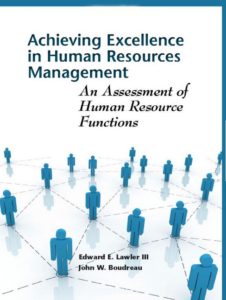 Like CEO’s previous research, this project measures whether the HR function is changing and on gauging its effectiveness. Edward E. Lawler III and John W. Boudreau pay particular attention to whether HR is changing to become an effective strategic partner. They also analyze how organizations can more effectively manage their human capital.
Like CEO’s previous research, this project measures whether the HR function is changing and on gauging its effectiveness. Edward E. Lawler III and John W. Boudreau pay particular attention to whether HR is changing to become an effective strategic partner. They also analyze how organizations can more effectively manage their human capital.
Beyond HR: The New Science of Human Capital
John W. Boudreau and Peter M. Ramstad (Harvard Business School Press, 2007)
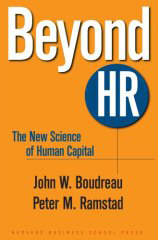 Beyond HR shows how organizations can uncover distinctive talent contributions, strategically differentiate their HR practices and metrics, and more optimally allocate talent to create value. Illustrations from companies such as Disney, Boeing, and Corning describe a new decision science called Talentship, that reveals opportunities by identifying strategy pivot points and the optimal talent and organization decisions that address them.
Beyond HR shows how organizations can uncover distinctive talent contributions, strategically differentiate their HR practices and metrics, and more optimally allocate talent to create value. Illustrations from companies such as Disney, Boeing, and Corning describe a new decision science called Talentship, that reveals opportunities by identifying strategy pivot points and the optimal talent and organization decisions that address them.
Achieving Strategic Excellence: An Assessment of Human Resource Organizations
Edward E. Lawler, John W. Boudreau, and Susan Albers Mohrman (Stanford Press, 2006)
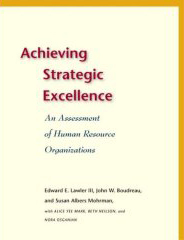 This is the Center for Effective Organizations’s (CEO) fourth national study of the human resources (HR) function in large corporations. It is the only long-term national study of this important function. It focuses on measuring whether the HR function is changing and on gauging its effectiveness. The study focuses particularly on whether the HR function is changing to become an effective strategic partner.
This is the Center for Effective Organizations’s (CEO) fourth national study of the human resources (HR) function in large corporations. It is the only long-term national study of this important function. It focuses on measuring whether the HR function is changing and on gauging its effectiveness. The study focuses particularly on whether the HR function is changing to become an effective strategic partner.

